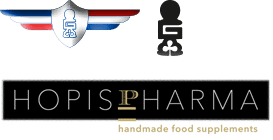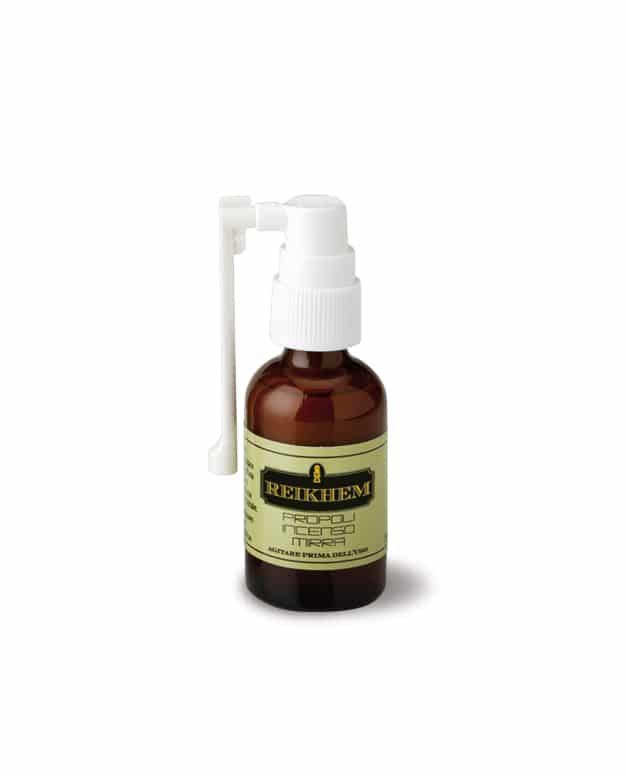Description
CHARACTERISTICS OF THE PRODUCT
Propolis Myrrh Incense
Propolis, incense and myrrh are among the most precious gifts of Nature; a spray inspired to ETHNOMEDICINE showing that history can bear a message and much more. The Italian Propolis obtained by selected beekeepers is combined with donkey’s milk, particularly rich in lysozymes and obtained fresh every day and freeze-dried.
A spray for the well-being of the mouth and throat with a strong adhesive mucus properties thanks to the mucilage acting in synergy with the Shiitake. Myrrh promotes the functioning of the oropharyngeal mucosa. Shiitake promotes the body’s natural defenses.
INGREDIENTS:
- ITALIAN HONEY
- CONCENTRATED at 34% ORGANIC DONKEY’S MILK
- ITALIAN PROPOLIS 10%
- COMMIPHORA MOLMOL ENGL. GUM RESIN
- BOSWELIA SERRATA ROXB. RESIN*
- LENTINULA EDODES (BERK.) PEGLER (SHITAKE)*
- STEVIA REBAUDIANA
- NATURAL FLAVOURS
HOW TO USE IT
3 sprays 3 times a day. Shake before use.
DAILY DOSES
Propolis 100mg
Boswellia 50mg
Myrrh 50mg
Shiitake 20mg
PACKAGE
30ml
Glass flask nebulizer in triangular cardboard box.
BIBLIOGRAFHY
Tucker AO. (1986) Frankincense and Myrrh. Econ Bot 40, 425– 433.
Mincione E, Iavarone C. (1972) Terpeni dalla Commifera mirra Arabica. Nota I. Chim Ind (Milan) 54, 424–425.
Wiendl RM, Franz G. (1994) Myrrh. New chemistry of an old plant drug. Dtsch Apoth Ztg 134, 27–29, 31–32.
Dolara P, Corte B, Ghelardini C, Pugliese AM, Cerbai E, Menichetti S, Lo Nostro A. (2000) Local anaesthetic, antibacterial and antifungal properties of sesquiterpenes from myrrh. Planta Med 66, 356–358
Michie CA, Cooper E. Frankincense and myrrh as remedies in children. J R Soc Med. 1991;84(10):602–605.
Borrelli F, Izzo AA. The plant kingdom as a source of anti-ulcer remedies. Phytother Res. 2000;14(8):581–591.
Azizah Al-Mobeeriek Effects of myrrh on intra-oral mucosal wounds compared with tetracycline- and chlorhexidine-based mouthwashes, Department of Oral Medicine and Diagnostic Sciences, College of Dentistry, King Saud University, Riyadh, Saudi Arabia
Lena Ciric, Anna Tymon, Egija Zaura, Peter Lingstrom, Monica Stauder, Adele Papetti, Caterina Signoretto, Jonathan Pratten, Michael Wilson, and David Spratt; In Vitro Assessment of Shiitake Mushroom (Lentinula edodes) Extract for Its Antigingivitis Activity; Journal of Biomedicine and Biotechnology; Volume 2011, Article ID 507908, 7 pages doi:10.1155/2011/507908
Tanner, M. F. J. Maiden, P. J. Macuch, L. L. Murray, and R. L. Kent, “Microbiota of health, gingivitis, and initial periodontitis,” Journal of Clinical Periodontology, vol. 25, no. 2, pp. 85–98, 1998.
Hirasawa, N. Shouji, T. Neta, K. Fukushima, and K. Takada, “Three kinds of antibacterial substances from Lentinus edodes (Berk.) Sing. (Shiitake, an edible mushroom),” International Journal of Antimicrobial Agents, vol. 11, no. 2, pp. 151–157, 1999.
Zaura Egija, Buijs Mark J, Hoogenkamp Michel A, Ciric Lena, Papetti Adele, Signoretto Caterina, et al. The Effects of Fractions from Shiitake Mushroom on Composition and Cariogenicity of Dental Plaque Microcosms in an In Vitro Caries Model. J Biomed Biotechnol. 2011;2011:1–10
Bernkop-Schnurch, A., Krist, S., Vehabovic, M., & Valenta, C. (1998). Synthesis and evaluation of lysozyme derivatives exhibiting an enhanced antimicrobial action. European Journal of Pharmaceutical Sciences, 6 (4), 301–306





